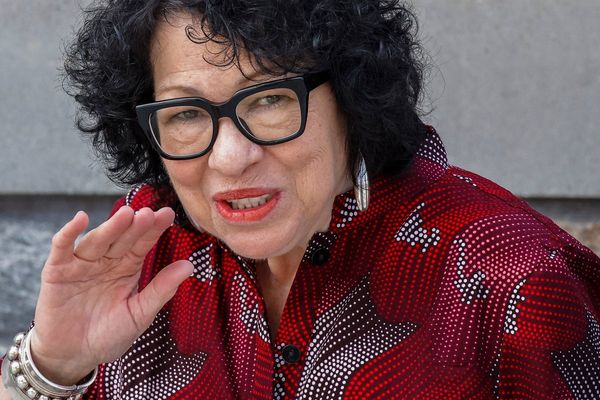Missile technology has helped power a golden run for China's Olympic athletes.
China has been sitting atop the Tokyo 2020 medal table with 36 golds and 79 in total, and according to the China Aerospace Science and Technology Corporation (CASC), competitors had some high-tech help on their way to Tokyo.
That's lead to China winning three gold, two silver and one bronze in the pool, an improvement from the 2016 Games, where the swimming team took home one gold, two silver and three bronze medals.
Using "aerospace measurement products" six world champions, including women's 200m butterfly winner Zhang Yufei and the gold medal winning women's 4×200m freestyle relay team, refined their techniques for the 2020 Games not just in the pool or gym.
Critical to their success were sessions in wind tunnels in state-run labs overseen by CASC scientists, who also built a compact version of a missile guidance system to gather data on athletes' posture.
"Through data analysis, they helped athletes formulate training programs scientifically and provided scientific support to improve the performance," the CASC said in a Weibo post.
"The system can obtain sports information such as athletes' posture, speed, position, angular velocity, acceleration, et cetera during training."
In the women's quad sculls rowing race, China's team won gold and set a new world record — beating the previous best time set by Germany in 2014 by more than a second.
They perfected their performance sitting in a metal tube, watched by coaches and scientists at facilities usually used for testing the aerodynamics of aircraft and missiles.
"Aerospace wind tunnel helps Olympic athletes win gold," the CASC said.
"The low-speed wind tunnel laboratory … successfully developed a three-dimensional force measurement platform to study the aerodynamic force of different athletes and the influence of different formation combinations on aerodynamic resistance."
The CASC said it was complicated and difficult to set up the wind tunnel for the rowing team.
"The test requires simulation of real competition conditions, the water surface needs to be simulated in the wind tunnel, and only the aerodynamic force above the water surface is measured," the CASC said.
'Climb the peak bravely and win glory for the country'
China has closely linked the country's economic and social development to improved success in competitive sports.
Since 1949, it has embarked on a four-phase plan of sports development.
That started with a push "to ensure the local development and catch-up of competitive sports", according to a 2019 official document from the government's General Administration of Sport of China.
"The main task of competitive sports has been to 'climb the peak bravely and win glory for the country … to train outstanding athletes for the country'," the document said.
When the People's Republic of China, commonly known as China, rejoined the International Olympic Committee in 1979 after dispute over Taiwan's legitimacy on the IOC, it started the second phase, focusing on "steady development".
Sports management and training were refined through this phase, which ran until the "rapid breakthrough stage", the third phase that would carry China's athletes through until the country hosted the Games.
"In 2008 Beijing Olympic Games, we achieved the goal of ranking first in the world in gold medals and medals, improved the comprehensive strength of competitive sports, shaped a good international image, and made a historic leap in international competitiveness of competitive sports," the document said.
The year after the Beijing Games, China shifted to the fourth phase, which was about "transformation, upgrading and all-round development stage".
It was under this part of the programme that missile technology came into play.
"China's competitive sports have become an important force in the international sports arena," the document said.
The government document also claims reforms have changed the way sporting performances have been seen in China.
"Competitive sports have gradually changed from the political value of mainly serving the rise of the country to the humanistic value of meeting social needs, " it said.
'Invite in and go out'
China has come from the wilderness and morphed into a sporting superpower in only two decades, Dr Geoff Dickson, the director of the Centre for Sport and Social Impact at La Trobe University, told the ABC.
Aside from using its scientists to refine performances, China also spent years on a policy, which translates as "invite in and go out", under which leading sports nations' development systems were closely studied.
That kicked off in the early 2000s – the lead up to the 2008 Beijing Olympics – and was also about sending elite athletes overseas to train under leading coaches with advanced practices.
"Whilst they're doing that, they're obviously making an awful lot of notes, and learning how to do things," Dr Dickson said.
To build their system to train world-class swimmers, China went to the UK, US and Australia to see what methods had brought those countries success in the pool.
After quickly realising the British were not that far ahead of them, China turned to the US and Australia.
The US high-performance systems were centred around universities and it was difficult to enrol Chinese athletes as students, which was a requirement to train under the big name US coaches employed by various universities.
In the end, Australia proved helpful and under the policy, Grant Hackett's former coach Denis Cotterell was hired to train disgraced Chinese Olympian Sun Yang.
In 2011, Yang beat Hackett's 1500m freestyle world record and went on to become one of the greatest swimmers of all time, with only Michael Phelps of the US having won more titles and medals.
More than just sports at play
Participation and success in elite sports competition in China has extended into the political sphere too, Dr Dickson said.
"Sport serves as a way to demonstrate that what matters is the nation and that people should be somewhat subservient, or should be very comfortable sacrificing their own interests for the benefit of the state," he told the ABC.
"Elite athletes are a wonderful, or at least in Chinese eyes, a powerful way of exemplifying that type of commitment to the nation."
The systems now behind China's successful Olympic teams aren't that different to what we have here.
"There are a few things in the Chinese sports system that we would fail to recognise as being at least somewhat similar to what we have in the Australian system," Dr Dickson said.
Those similarities also extend to the political aspect of elite competitive sport.
"Just as the Australian government discovered sport as a policy instrument in the early 1970s, it was not long after that China embraced it as well," Dr Dickson said.
On top of the time and public money spent on sports development, China has another advantage.
Its massive population.
"So somewhere in amongst that you're going to have people that have the necessary physiological, biological, biomechanical and psychological attributes to be elite athletes," Dr Dickson said.
In the end, all the expenditure, study, technology and development has lead to what the Chinese government calls "the development path of sports with Chinese characteristics".
And a lot of gold medals.
Read the story in Chinese: 阅读中文版本






